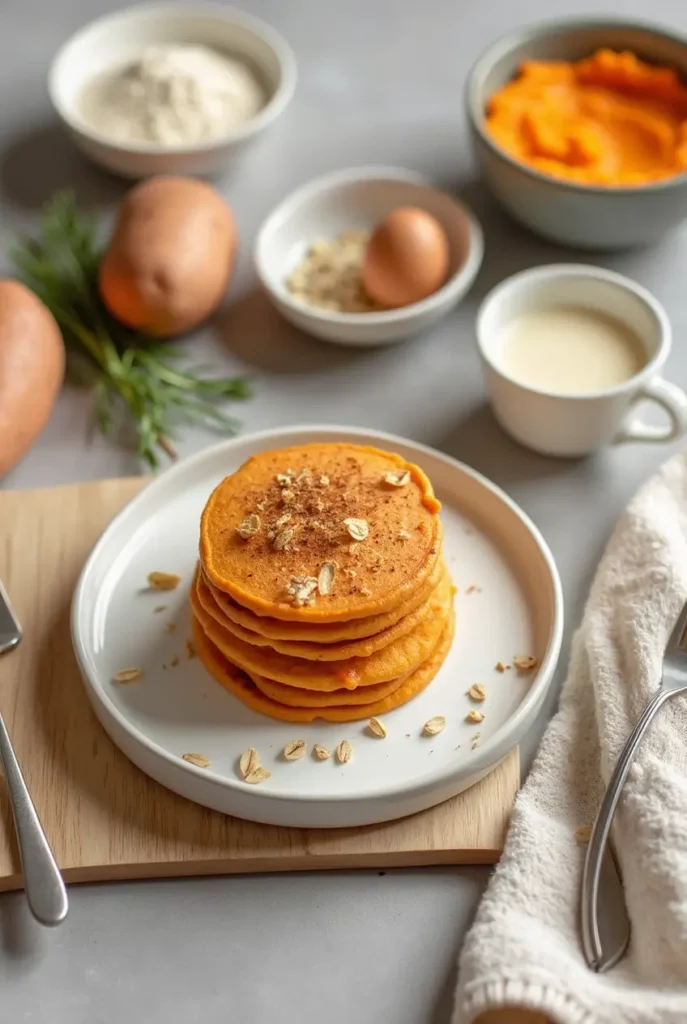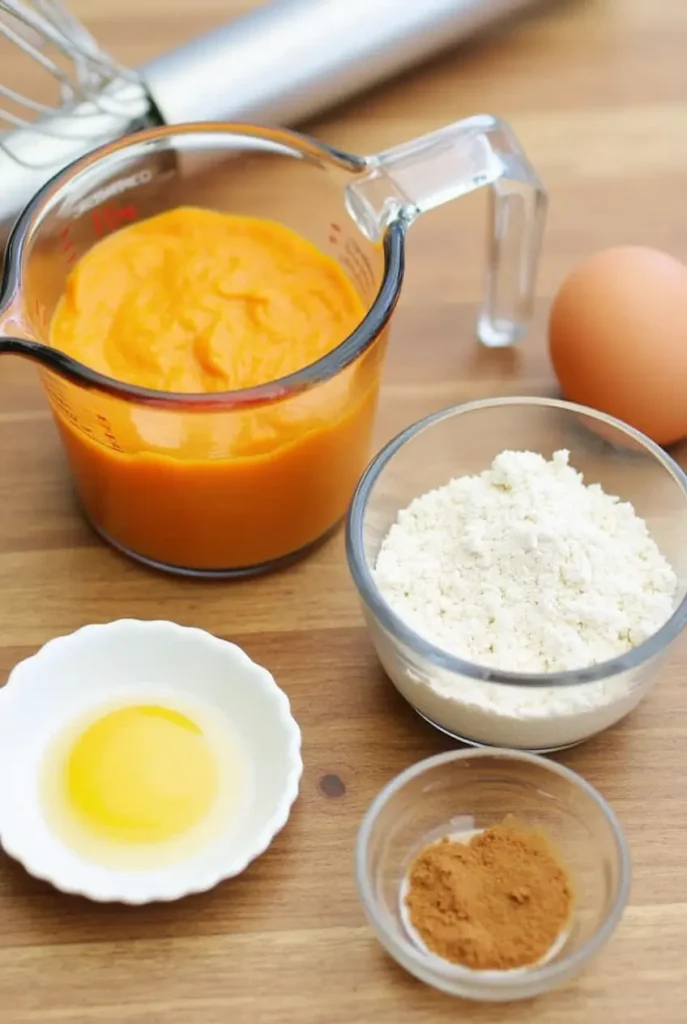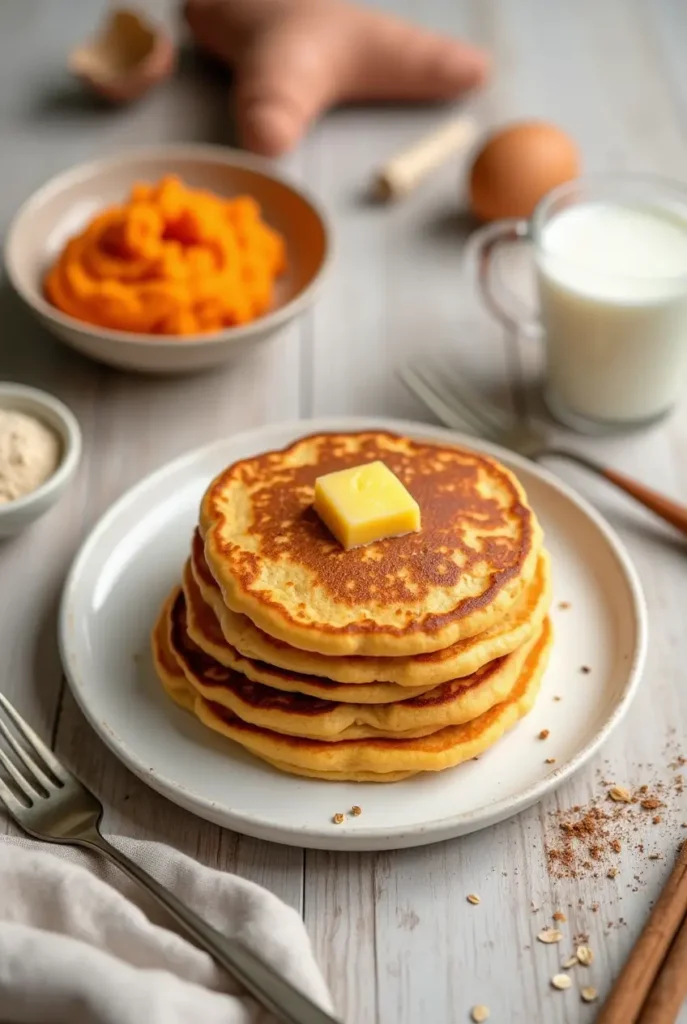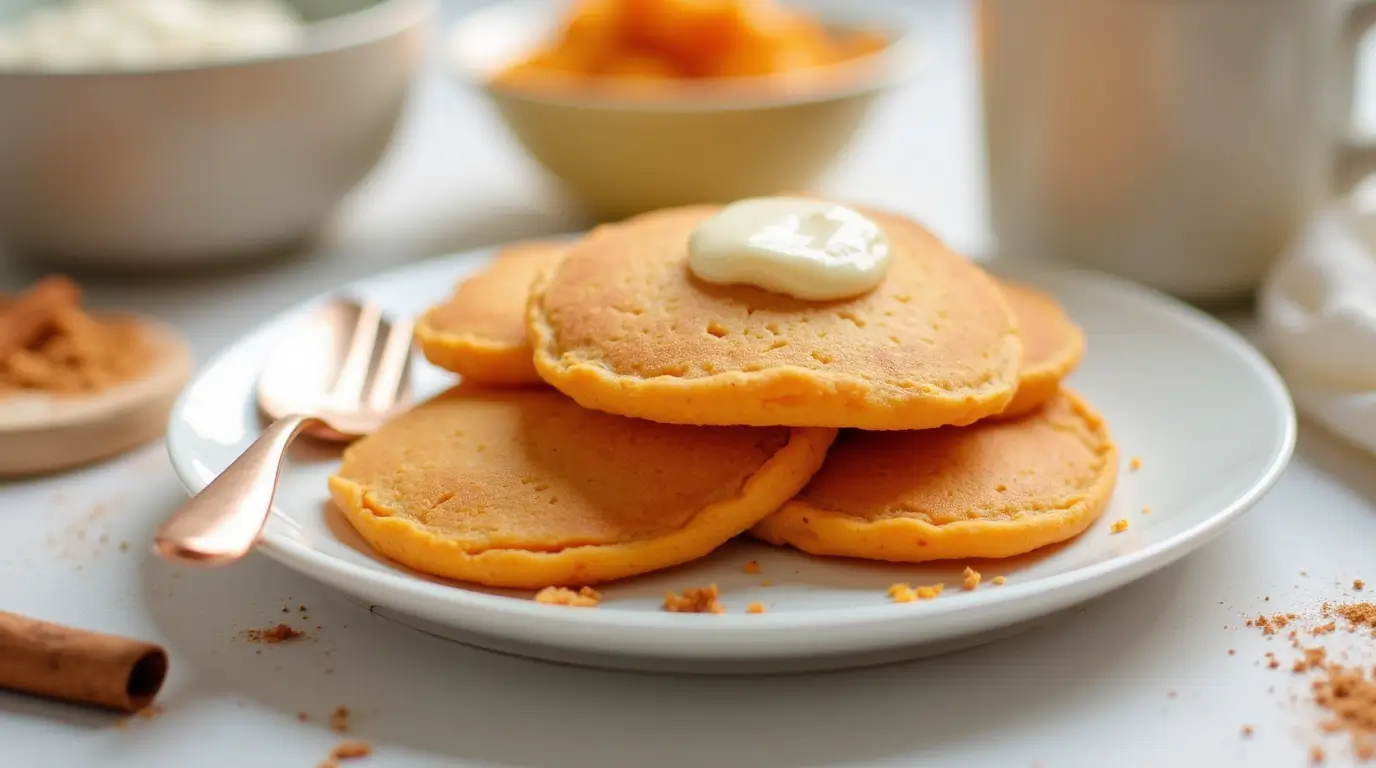The introduction of solid foods to your infant can be a thrilling adventure.. It’s a time to explore new flavors and textures.
One nutritious and delicious option is sweet potato pancakes for baby . They’re a creative way to incorporate this healthy vegetable into your baby’s diet.
Sweet potatoes are abundant in vitamins A and C.. They’re also soft and easy for babies to eat.
This article will guide you through a simple recipe for sweet potato pancakes. It’s designed with your baby’s nutritional needs in mind.
We’ll also share tips on serving and storage. Plus, we’ll discuss how to adapt the recipe for different ages and allergies.
So, let’s embark on this culinary adventure together. Your infant’s palate is about to experience a delightful treat.
Why Sweet Potatoes are Great for Baby

Sweet potatoes are a powerhouse of nutrition, making them ideal for your little one’s diet. They’re packed with essential vitamins and minerals crucial for growth.
Here are some reasons to love sweet potatoes:
- Rich in Vitamins: They provide abundant vitamins A and C, supporting vision and immunity.
- Fiber in Diet: Aids in maintaining digestive health and consistent bowel activity.
- Natural Sweetness: Offers a sweet taste that appeals to babies without added sugars.
Including sweet potatoes in baby meals helps them develop a taste for vegetables early on. They’re versatile and blend well with other baby-friendly foods.
Preparing Sweet Potato Puree for Pancakes
Making sweet potato puree is simple and ensures your baby’s pancakes are soft and smooth. Start by selecting fresh, organic sweet potatoes to avoid any chemicals. This provides a pure and healthy base for your little one’s meal.
To prepare the puree, wash the sweet potatoes thoroughly and peel them. Cut them into even cubes to ensure they cook evenly. Boil or steam the sweet potatoes until tender, usually about 15-20 minutes.
Once cooked, transfer the sweet potato cubes into a blender or food processor. Mix until it’s smooth, incorporating a bit of water if necessary for uniformity.. Allow the puree to cool before incorporating it into pancake batter. This puree can also be stored in the fridge for up to three days.
Simple Recipe for Sweet Potato Pancakes for baby

Creating sweet potato pancakes for your baby is both enjoyable and rewarding. This simple recipe involves minimal ingredients and can be prepared quickly. The outcome is delightful pancakes that are soft, nutritious, and appealing to your baby’s palate.
You’ll want to ensure that all ingredients are baby-friendly, easily digestible, and safe for consumption. Adjusting for allergies or preferences is straightforward with this adaptable recipe. Adding or omitting certain ingredients can tailor the pancakes to suit your child’s dietary needs.
These pancakes are not just for babies—they can be a treat for the whole family. With some slight modifications, older siblings and adults can enjoy them too. Consider this recipe as a family favorite in the making.
Ingredients

To prepare these delicious pancakes, gather the following simple ingredients:
- 1 cup sweet potato puree
- 1 egg or flax egg substitute
- 1/4 cup flour (oat, whole wheat, or gluten-free)
- A pinch of cinnamon
- Optional: 1 tablespoon of either olive oil or melted butter
Step-by-Step Instructions
Begin by combining the sweet potato puree, egg, and flour in a mixing bowl. Blend until smooth and free of lumps, ensuring a consistent batter. If the mixture appears too thick, a splash of milk can help achieve the desired consistency.
Heat a non-stick pan over low to medium heat. Grease the pan lightly with oil or butter to prevent sticking. Scoop small spoonfuls of batter onto the pan, shaping them into mini pancakes.
Allow each pancake to cook for about 2-3 minutes on one side. Turn over when bubbles emerge on the surface and the perimeters seem firm. Cook the other side until golden brown.
After cooking, transfer the pancakes to a plate and let them cool slightly. They should be cooled enough to avoid burning but warm enough to tantalize your baby’s taste buds. Enjoy these delightful pancakes with your little one!
Nutritional Benefits of Sweet Potato Pancakes

Sweet potato pancakes are packed with nutrients essential for your baby’s growth and development. They offer a gentle introduction to solid foods, supplying vital vitamins and minerals in each bite. Including sweet potato in your baby’s diet provides a natural source of wholesome goodness without excess additives.
Here are some key nutritional benefits of sweet potatoes for your baby:
- Vitamin A: Supports vision and immune function.
- Vitamin C: Enhances the immune system and assists in absorbing iron.
- Dietary Fiber: Promotes healthy digestion and prevents constipation.
- Potassium: Helps regulate fluid balance and nerve signals.
Incorporating sweet potato pancakes into meals ensures your baby receives a balanced and nutritious start. This tasty recipe can support developmental milestones, enhancing overall well-being.
Tips for Serving and Storage
Serving sweet potato pancakes can be a fun experience for both you and your baby. These pancakes make an excellent finger food, promoting fine motor skills as your baby learns to grasp and self-feed. Simply cut the pancakes into manageable pieces for your little one to enjoy safely.
To keep the pancakes fresh and convenient, consider making extra batches. You can freeze them for later use, offering a quick meal option on busy days. When storing, separate the pancakes with parchment paper to prevent sticking, and place them in an airtight container.
Here’s a quick list of serving and storage tips:
- Portion control: Serve age-appropriate sizes.
- Freezing: Store in a freezer-safe bag for up to 3 months.
- Reheating: Gently warm in the oven or microwave before serving to ensure a soft texture.
By following these tips, you can make mealtime enjoyable and hassle-free for your family.
Adapting the Recipe for Different Ages and Allergies

Sweet potato pancakes can be customized to suit your child’s age and dietary needs. For younger babies, keep the texture soft by adding more puree or using less flour. Older toddlers might enjoy slightly firmer pancakes with added texture.
Allergies are a common concern, but this recipe can be easily adapted. For a gluten-free option, replace regular flour with almond or coconut flour. If your baby is sensitive to dairy, opt for plant-based milk like almond or oat milk.
Here are some variations to consider:
- Egg allergies: Use flaxseed meal or mashed banana as a binder.
- Vegan option: Omit any animal-derived ingredients.
- Nut-free: Use sunflower seed flour instead of nut-based flours.
These adaptations ensure that the pancakes are safe, nutritious, and enjoyable for every baby, no matter their dietary restrictions.
Engaging Your Baby with Mealtime
Mealtime is an opportunity to bond and explore new textures with your baby. Encourage them to touch and play with their food, making eating a fun experience.
Use positive reinforcement by praising your baby’s efforts and curiosity. This encourages healthy eating habits and creates a joyful atmosphere around food.
The Importance of Healthy Foods for Your Baby’s Development

Incorporating solid foods into your infant’s diet marks a substantial milestone. These early meals play a crucial role in providing the essential nutrients needed for their growth and well-being. It’s important to focus on foods that are rich in vitamins and minerals, and sweet potatoes are an excellent choice for this.
Babies have specific nutritional needs to support their rapid growth. Vitamin A, for instance, is crucial for eye development and immune function. It helps protect your baby’s vision and strengthens their immune system. Sweet potatoes, being rich in vitamin A, are a fantastic option to fulfill these needs.
A Balanced Diet for Healthy Growth
As your baby begins exploring new foods, it’s essential to create a balanced diet that incorporates a variety of nutrients. While fruits and vegetables like sweet potatoes are great, don’t forget about the importance of proteins, healthy fats, and whole grains. These nutrients work together to ensure your baby’s body can function optimally and reach their developmental milestones.
For instance, protein is essential for muscle growth and cell repair. You can include plant-based proteins, such as beans, lentils, and peas, alongside sweet potatoes for a well-rounded meal. Healthy fats, found in foods like avocado and olive oil, support brain development and energy production.
Introducing a variety of flavors and textures helps your baby become accustomed to different foods, making the transition to solid meals a smoother process. By offering a range of vegetables, fruits, and grains, you’re laying the foundation for healthy eating habits that can last a lifetime.
Benefits of Early Exposure to Vegetables
One of the greatest benefits of including vegetables like sweet potatoes early in your baby’s diet is that it helps them develop a taste for healthy foods. Early exposure to a variety of vegetables encourages your baby to appreciate these flavors and makes it more likely they’ll accept vegetables as they grow.
Sweet potatoes, with their natural sweetness, are a great starting point. Their soft texture makes them easy to mash or puree, ensuring your baby can enjoy them without any difficulty. By incorporating vegetables in fun, creative ways, like in pancakes, you’re making healthy eating enjoyable for your little one.
The Role of Fiber in Your Baby’s Diet
Fiber is another essential nutrient that contributes to your baby’s digestive health. Sweet potatoes are naturally high in fiber, which helps prevent constipation and supports overall gut health. Introducing fiber-rich foods like sweet potatoes early on can aid in developing a healthy digestive system, which is especially important as your baby moves from breast milk or formula to solid foods.
Fiber also promotes feelings of fullness, ensuring your baby stays satisfied between meals. It helps regulate bowel movements and can prevent tummy discomfort, providing a more comfortable mealtime experience for your baby.
Adapting the Recipe for Different Stages of Development
As your baby grows and progresses through different stages of eating, you can adapt the sweet potato pancake recipe to suit their needs. For younger babies who are just starting solids, you can make the pancakes even softer by increasing the amount of sweet potato puree. This ensures a smooth, easy-to-swallow texture that is gentle on their tiny tummies.
For older babies or toddlers, you can slightly adjust the consistency to create firmer pancakes with a bit more texture. Adding small pieces of finely chopped vegetables or herbs can introduce new flavors and further expand their palate.
As your baby becomes more accustomed to solid foods, you can begin incorporating other ingredients like small amounts of cheese or yogurt, making the pancakes even more nutritious.
Conclusion and Encouragement for Parents
Sweet potato pancakes are a nutritious and tasty option for your little one. They introduce flavors and support growth and development.
Enjoy the process of making these pancakes, knowing you’re providing healthy choices. Encourage baby to explore and embrace new foods happily.
Printable Recipe Card
For added convenience, here’s a printable recipe card featuring these delightful pancakes. It includes ingredients and easy step-by-step instructions. Feel free to share it with other parents looking for nourishing options for their babies. Enjoy the joy of cooking for your little one!

